culture-shock中英文对照
- 格式:doc
- 大小:46.00 KB
- 文档页数:6


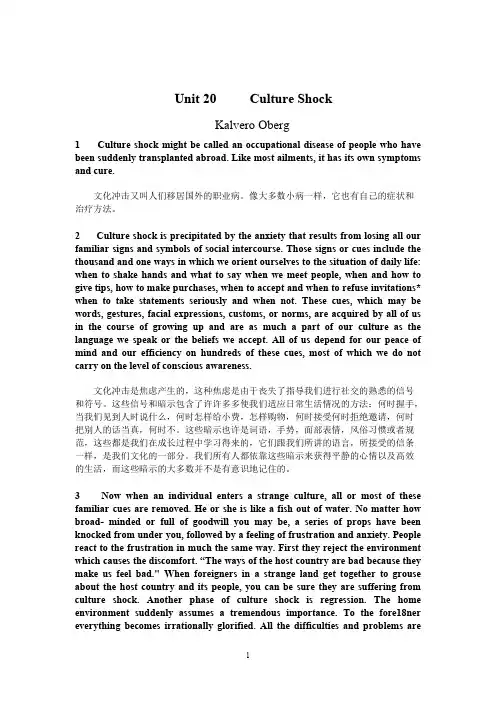
Unit 20 Culture ShockKalvero Oberg1 Culture shock might be called an occupational disease of people who have been suddenly transplanted abroad. Like most ailments, it has its own symptoms and cure.文化冲击又叫人们移居国外的职业病。
像大多数小病一样,它也有自己的症状和治疗方法。
2 Culture shock is precipitated by the anxiety that results from losing all our familiar signs and symbols of social intercourse. Those signs or cues include the thousand and one ways in which we orient ourselves to the situation of daily life: when to shake hands and what to say when we meet people, when and how to give tips, how to make purchases, when to accept and when to refuse invitations* when to take statements seriously and when not. These cues, which may be words, gestures, facial expressions, customs, or norms, are acquired by all of us in the course of growing up and are as much a part of our culture as the language we speak or the beliefs we accept. All of us depend for our peace of mind and our efficiency on hundreds of these cues, most of which we do not carry on the level of conscious awareness.文化冲击是焦虑产生的,这种焦虑是由于丧失了指导我们进行社交的熟悉的信号和符号。
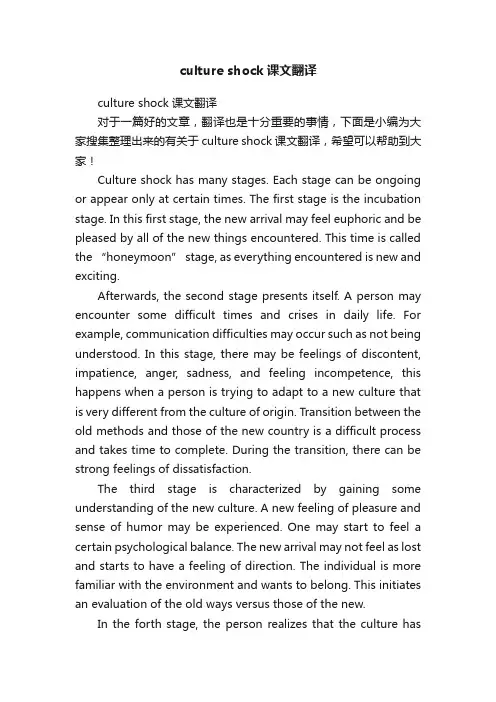
culture shock课文翻译culture shock课文翻译对于一篇好的文章,翻译也是十分重要的事情,下面是小编为大家搜集整理出来的有关于culture shock课文翻译,希望可以帮助到大家!Culture shock has many stages. Each stage can be ongoing or appear only at certain times. The first stage is the incubation stage. In this first stage, the new arrival may feel euphoric and be pleased by all of the new things encountered. This time is called the “honeymoon” stage, as everything encountered is new and exciting.Afterwards, the second stage presents itself. A person may encounter some difficult times and crises in daily life. For example, communication difficulties may occur such as not being understood. In this stage, there may be feelings of discontent, impatience, anger, sadness, and feeling incompetence, this happens when a person is trying to adapt to a new culture that is very different from the culture of origin. Transition between the old methods and those of the new country is a difficult process and takes time to complete. During the transition, there can be strong feelings of dissatisfaction.The third stage is characterized by gaining some understanding of the new culture. A new feeling of pleasure and sense of humor may be experienced. One may start to feel a certain psychological balance. The new arrival may not feel as lost and starts to have a feeling of direction. The individual is more familiar with the environment and wants to belong. This initiates an evaluation of the old ways versus those of the new.In the forth stage, the person realizes that the culture hasgood and bad things to offer. This stage can be one of double integration or triple integration depending on the number of cultures that the person has to process. This integration is accompanied by a more solid feeling of belonging. The person starts to define him/herself and establish goals for living.The fifth stage is the stage that is called the “re-entry shock..” this occurs when a return to the country of origin is made. One may fin that things are no longer the same. For example, some of the newly acquired customs are not in use in the old culture.These stages are present at different times and each person has their own way of reacting in the stages of culture shock. As a consequence, some stages will be longer and more difficult than others. Many factors contribute to the duration and effects of culture shock. For example, the individual’s state of mental health, type of personality, previous experiences, socio-economic conditions, familiarity with the language, family and/or social support systems,and level of education.翻译文化冲击有许多阶段。
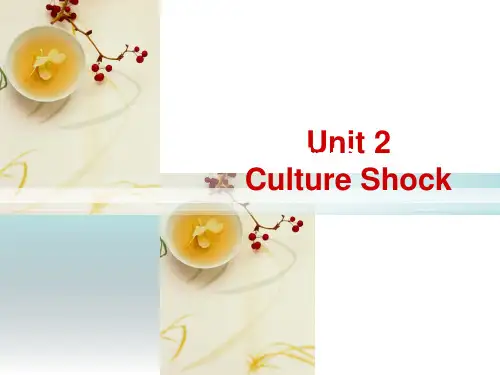

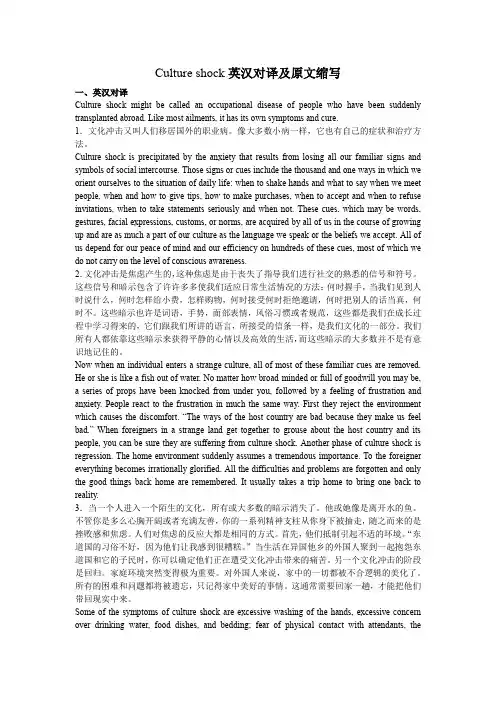
Culture shock英汉对译及原文缩写一、英汉对译Culture shock might be called an occupational disease of people who have been suddenly transplanted abroad. Like most ailments, it has its own symptoms and cure.1.文化冲击又叫人们移居国外的职业病。
像大多数小病一样,它也有自己的症状和治疗方法。
Culture shock is precipitated by the anxiety that results from losing all our familiar signs and symbols of social intercourse. Those signs or cues include the thousand and one ways in which we orient ourselves to the situation of daily life: when to shake hands and what to say when we meet people, when and how to give tips, how to make purchases, when to accept and when to refuse invitations, when to take statements seriously and when not. These cues, which may be words, gestures, facial expressions, customs, or norms, are acquired by all of us in the course of growing up and are as much a part of our culture as the language we speak or the beliefs we accept. All of us depend for our peace of mind and our efficiency on hundreds of these cues, most of which we do not carry on the level of conscious awareness.2.文化冲击是焦虑产生的,这种焦虑是由于丧失了指导我们进行社交的熟悉的信号和符号。
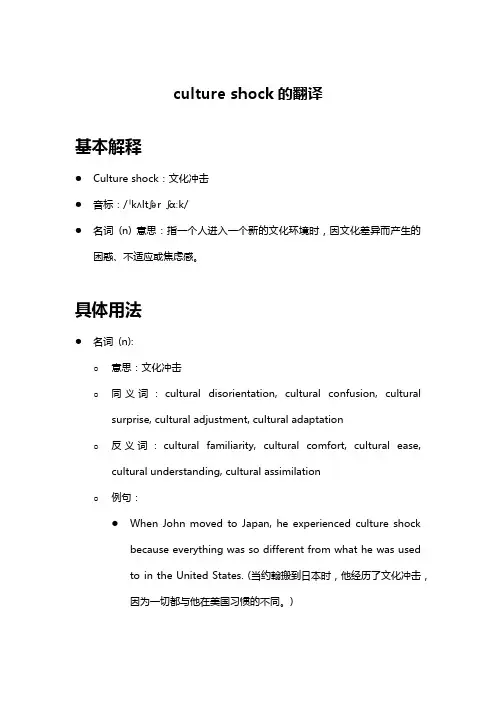
culture shock的翻译基本解释●Culture shock:文化冲击●音标:/ˈkʌltʃər ʃɑːk/●名词(n) 意思:指一个人进入一个新的文化环境时,因文化差异而产生的困惑、不适应或焦虑感。
具体用法●名词(n):o意思:文化冲击o同义词:cultural disorientation, cultural confusion, cultural surprise, cultural adjustment, cultural adaptationo反义词:cultural familiarity, cultural comfort, cultural ease, cultural understanding, cultural assimilationo例句:●When John moved to Japan, he experienced culture shockbecause everything was so different from what he was usedto in the United States. (当约翰搬到日本时,他经历了文化冲击,因为一切都与他在美国习惯的不同。
)●Culture shock can be overwhelming, but it often leads topersonal growth and a deeper understanding of the world.(文化冲击可能会让人不知所措,但它通常会带来个人成长和对世界更深刻的理解。
)●Many students studying abroad face culture shock, but withtime, they learn to adapt and appreciate the new culture. (许多留学生面临文化冲击,但随着时间的推移,他们学会适应并欣赏新的文化。
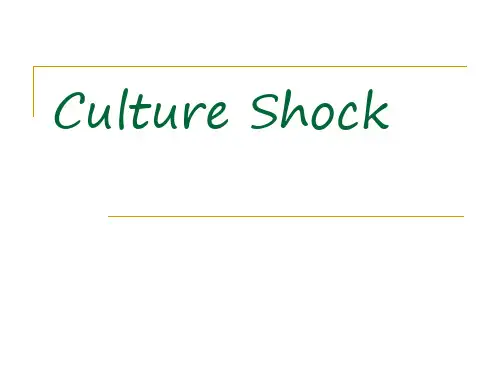
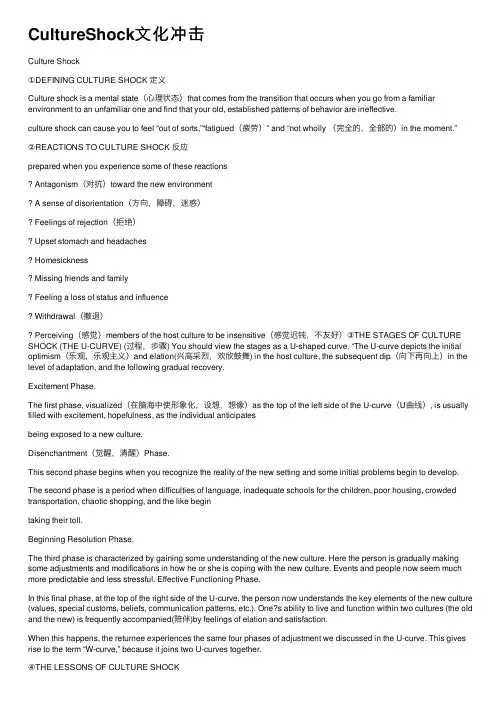
CultureShock⽂化冲击Culture Shock①DEFINING CULTURE SHOCK 定义Culture shock is a mental state(⼼理状态)that comes from the transition that occurs when you go from a familiar environment to an unfamiliar one and find that your old, established patterns of behavior are ineffective.culture shock can cause you to feel “out of sorts,”“fatigued(疲劳)” and “not wholly (完全的,全部的)in the moment.”②REACTIONS TO CULTURE SHOCK 反应prepared when you experience some of these reactionsAntagonism(对抗)toward the new environmentA sense of disorientation(⽅向,障碍,迷惑)Feelings of rejection(拒绝)Upset stomach and headachesHomesicknessMissing friends and familyFeeling a loss of status and influenceWithdrawal(撤退)Perceiving(感觉)members of the host culture to be insensitive(感觉迟钝,不友好)③THE STAGES OF CULTURE SHOCK (THE U-CURVE) (过程,步骤) You should view the stages as a U-shaped curve. “The U-curve depicts the initial optimism(乐观,乐观主义)and elation(兴⾼采烈,欢欣⿎舞) in the host culture, the subsequent dip(向下再向上)in the level of adaptation, and the following gradual recovery.Excitement Phase.The first phase, visualized(在脑海中使形象化,设想,想像)as the top of the left side of the U-curve(U曲线), is usually filled with excitement, hopefulness, as the individual anticipatesbeing exposed to a new culture.Disenchantment(觉醒,清醒)Phase.This second phase begins when you recognize the reality of the new setting and some initial problems begin to develop. The second phase is a period when difficulties of language, inadequate schools for the children, poor housing, crowded transportation, chaotic shopping, and the like begintaking their toll.Beginning Resolution Phase.The third phase is characterized by gaining some understanding of the new culture. Here the person is gradually making some adjustments and modifications in how he or she is coping with the new culture. Events and people now seem much more predictable and less stressful. Effective Functioning Phase.In this final phase, at the top of the right side of the U-curve, the person now understands the key elements of the new culture (values, special customs, beliefs, communication patterns, etc.). One?s ability to live and function within two cultures (the old and the new) is frequently accompanied(陪伴)by feelings of elation and satisfaction.When this happens, the returnee experiences the same four phases of adjustment we discussed in the U-curve. This gives rise to the term “W-curve,” because it joins two U-curves together.④THE LESSONS OF CULTURE SHOCKOur discussion of culture shock was predicated on two premises.F irst, each year millions of people go abroad to work, travel, and study.Second, many of those experiences end up producing stress, homesickness, and confusion.A lthough we have placed the topic of culture shock under the category of “problems,” we would be remiss if we concluded our discussion without emphasizing the idea that culture shock can be an explicit learning experience.E xperiencing culture shock has a strong potential to make people bemulticulturalBeyond Culture ShockN ewcomers may not be ready to learn and practice social behaviors appropriate to the new culture in the initial period of settlement. It is not unusual for recent arrivals 。
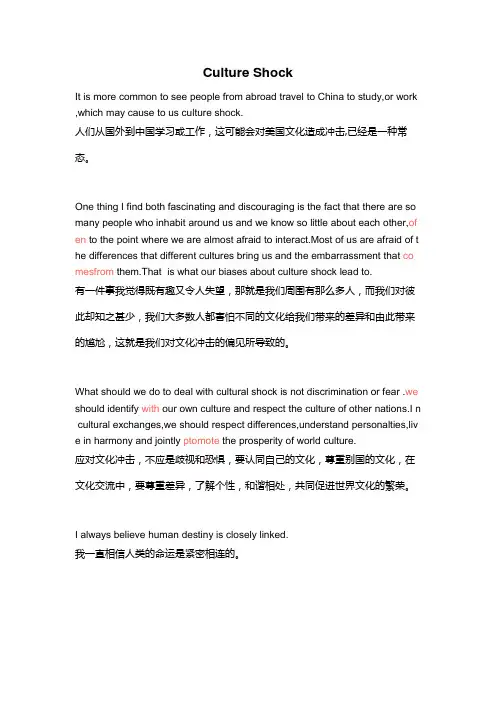
Culture ShockIt is more common to see people from abroad travel to China to study,or work ,which may cause to us culture shock.人们从国外到中国学习或工作,这可能会对美国文化造成冲击,已经是一种常态。
One thing I find both fascinating and discouraging is the fact that there are so many people who inhabit around us and we know so little about each other,of en to the point where we are almost afraid to interact.Most of us are afraid of t he differences that different cultures bring us and the embarrassment that co mesfrom them.That is what our biases about culture shock lead to.有一件事我觉得既有趣又令人失望,那就是我们周围有那么多人,而我们对彼此却知之甚少,我们大多数人都害怕不同的文化给我们带来的差异和由此带来的尴尬,这就是我们对文化冲击的偏见所导致的。
What should we do to deal with cultural shock is not discrimination or fear .we should identify with our own culture and respect the culture of other nations.I n cultural exchanges,we should respect differences,understand personalties,liv e in harmony and jointly ptomote the prosperity of world culture.应对文化冲击,不应是歧视和恐惧,要认同自己的文化,尊重别国的文化,在文化交流中,要尊重差异,了解个性,和谐相处,共同促进世界文化的繁荣。
(解释、同义词、反义词、习惯用语、构词法等)1.MannerA way of acting; bearing or behavior举止:行为的方式;good…,bad …,a very rude mannerIt's bad manners to talk with a full mouth.嘴里吃着东西说话是不礼貌的。
You should have good manners all the time.任何时候都应该有礼貌。
2.dietThe usual food and drink of a person or animal.饮食to go on a diet节食;吃限定食物He began his diet a week ago.他在一星期前开始节食。
People who are on a diet mustn't have chocolate.正在节食的人不能吃巧克力。
3.customA practice followed by people of a particular group or region.习俗,风俗His custom was to get up early and have a cold bath.他的习惯是早起,然后洗个冷水澡。
关税, 海关(pl.)At the airport; the customs officers searched his case.在机场,海关人员检查了他的箱子。
4.culture shockA condition of confusion and anxiety affecting a person suddenly exposed to an alien culture or milieu.文化震惊:某人突然身处异族文化或环境中而经受的一种困惑焦虑的状况5.definitely明确地Very similar to definite but as an adjective形容词, "definitely" tells us how can describe a noun.For example: I'm definitely sure that this deer can fly.6.accept /receiveI've received收到a gift from him, but I'm not going to accept接受it.我收到了他送的礼物,但是我不准备接受。
Unit 20 Culture ShockKalvero Oberg1 Culture shock might be called an occupational disease of people who have been suddenly transplanted abroad. Like most ailments, it has its own symptoms and cure.文化冲击又叫人们移居国外的职业病。
像大多数小病一样,它也有自己的症状和治疗方法。
2 Culture shock is precipitated by the anxiety that results from losing all our familiar signs and symbols of social intercourse. Those signs or cues include the thousand and one ways in which we orient ourselves to the situation of daily life: when to shake hands and what to say when we meet people, when and how to give tips, how to make purchases, when to accept and when to refuse invitations* when to take statements seriously and when not. These cues, which may be words, gestures, facial expressions, customs, or norms, are acquired by all of us in the course of growing up and are as much a part of our culture as the language we speak or the beliefs we accept. All of us depend for our peace of mind and our efficiency on hundreds of these cues, most of which we do not carry on the level of conscious awareness.文化冲击是焦虑产生的,这种焦虑是由于丧失了指导我们进行社交的熟悉的信号和符号。
Unit 20 Culture ShockKalvero Oberg1 Culture shock might be called an occupational disease of people who have been suddenly transplanted abroad. Like most ailments, it has its own symptoms and cure.文化冲击又叫人们移居国外的职业病。
像大多数小病一样,它也有自己的症状和治疗方法。
2 Culture shock is precipitated by the anxiety that results from losing all our familiar signs and symbols of social intercourse. Those signs or cues include the thousand and one ways in which we orient ourselves to the situation of daily life: when to shake hands and what to say when we meet people, when and how to give tips, how to make purchases, when to accept and when to refuse invitations* when to take statements seriously and when not. These cues, which may be words, gestures, facial expressions, customs, or norms, are acquired by all of us in the course of growing up and are as much a part of our culture as the language we speak or the beliefs we accept. All of us depend for our peace of mind and our efficiency on hundreds of these cues, most of which we do not carry on the level of conscious awareness.文化冲击是焦虑产生的,这种焦虑是由于丧失了指导我们进行社交的熟悉的信号和符号。
Culture Shock Cause and SymptomsKalvero ObergCulture shock might be called an occupational disease of people who have been suddenly transplanted abroad. Like most diseases, it has its own symptoms.文化休克是突然移居国外的人的一种职业病. 像大多数疾病一样,它有自己的征兆.Culture shock is caused by the anxiety that results from losing all our familiar signs and symbols of social intercourse. Those signs or cues include the thousand and one ways with which we are familiar in the situation of daily life: when to shake hands and what to say when we meet people, when and how to give tips, how to go shopping, when to accept and when to refuse invitations, when to take statements seriously and when not. These cues, which may be words, gestures, facial expressions, customs, or norms, are acquired by all of us in the course of growing up and are as much a part of our culture as the language we speak or the beliefs we accept. All of us depend for our peace of mind and our efficiency on hundreds of these cues, often with our conscious awareness.文化休克是由于失去我们熟悉的标志和社会环境而导致的焦虑.这些标志包括我们熟悉的日常生活,遇到别人知道何时握手,说些什么,知道什么时候如何给小费,如何购物,何时接受或拒绝邀请,何时严肃何时放松.这些可能是语言,手势,面部表情,风俗或规定,我们成长的过程中一直遵守,是文化的一部分,就像我们语言或信仰一样.我们依靠这些思想和标志,成为我们的潜意识.Now when a person enters a strange culture, all or most of these familiar cues are removed, He or she is like a fish out of water. No matter how broad-minded or full of goodwill you may be,a series of props have knocked from under you, followed by a feeling of frustration and anxiety. People react to the frustration in much the same way. First they reject the environment which causes the discomfort. “The ways of the host country are bad because they made us feel bad.” When foreigners in a strange land get together to grumble about the host country and its people, you can be sure they are suffering from culture shock. Another symptom of culture shock is regression. To the foreigner everything becomes irrationally glorified. All the difficulties and problems are forgotten and only the good things back home are remembered. It usually takes a trip home to bring one back to reality.当一个人进入一个陌生的环境,所以这些熟悉的线索都消失了.他就像一条离开了水的鱼, 不管你有多么的思想开放多么的友好善良,一系列的问题会来到你的身边,带给你沮丧和焦虑.人们对挫折的反应大致相同,首先是拒绝带给他不适的环境, “这个国家很坏因为它让我感觉很坏”.当一个陌生地方的人一起抱怨这个国家和这个国家的人, 你就可以肯定他们正在遭受文化冲击.文化休克的另一个症状就是逃避.对于一个外国人来说每一样事物都变的无法忍受.所有的困难和问题都忘记了,只剩下回家这一个念头. 通常只有一趟回家之旅才会把他带回现实.Some of the symptoms of culture shock are: excessive washing of the hands; excessive concern over drinking water, food dishes, and bedding; fear of physical contact with attendants; the absent-minded stare; a feeling of helplessness and a desire for dependence on long-term residents of one's own nationality; fits of anger over minor frustrations; great concern over minor pains and eruptions of the skin; and finally, that terrible longing to be back home.文化休克的另一些症状是:过度的洗手,过度关注饮用水,食物,床上用品,恐惧与服务员身体接触,失神凝望,感觉很无助,渴望依赖在这里长期居住的同国籍的人, 小事就能引起愤怒,对轻微的疼痛和皮疹过度关注, 最终极度渴望重返家园.Individual differ greatly in the degree in which culture shock affects them. Although not common, there are individual who cannot live in foreign countries. However, those who have seen people go through culture shock and on to a satisfactory adjustment can see steps in the process.文化冲击对不同的人有不同程度的影响.尽管并不普遍, 有些人不能在国外生活.然而,可以看看有些已经克服文化冲击并且有一个满意的调整,可以参照一下步骤.Stages of AdjustmentRaymond ZeuschnerKalvero Oberg describes four stages that people go through when they experience situations that are very different from those to which they are accustomed. Examples of such situations include moving to a new city, traveling to anew country, and becoming part of a new organization, military unit or corporation.Kalvero Oberg介绍了适应与他们熟悉的环境有很大不同的情况有四个阶段.包括移居到一个新的城市,前往一个新的国家,成为一个组织,军队或公司的一员.Stage one is a honeymoon phase, during which the new experience is perceived to be interesting, picturesque, entertaining, and charming. You may notice several superficial differences such as music, food and clothing, and the fresh appeal of the new experience keeps you feeling interested and positive. If you are a real tourist, you probably do not stay long enough for this phase to wear off but go on to the next new location or experience. There are people who frequently change jobs, majors, romantic partners, travel plans, clothing styles, foods, diets, or cars so that they never get very far away from the honeymoon stage of culture shock. It is very pleasant to travel and to try out and explore whatever is new.第一阶段是一个蜜月期.在此期间新的体验被认为是有趣的,美丽的,好玩的,迷人的.你可能会注意到一些肤浅的差异,比如音乐,食物,衣服,新经验让你感觉新鲜有趣.如果你是一个真正的旅游者,在这个阶段不会停留很久,因为会去新的地方,有新的经历.有些人经常更换工作, 专业的浪漫的合作者,旅行计划,服装风格,食品,饮食,或汽车,因此,他们离文化冲击很远.蜜月阶段是非常愉快的旅行,并尝试和探索一切新的东西.When you stay in a new environment for a while, you move to stage two——the crisis stage——in which the shine wears off and the day-to-day realities sink in. In a relationship, you notice annoying habbits; in a new country, you find barriers to establishing connections or to learning the language beyond a few polite phrases. Suddenly, your new major includes a class or a professor you dislike. The difficulties and unpleasantness of realities replace the charming and picturesque “honeymoon.' However,if you stick with the experience and try to deal with it realistically, you will probably move to the third phase of culture shock: recovery.当你在一个新环境待一段时间,你就进入了第二阶段——危机阶段——在这个阶段所以的光环消退,现实的环境摆在你面前.在人际关系方面,你发现了令人烦恼的障碍,在一个新的国家,你发现建立人际关系学习新的语言是有障碍的,比起第一个阶段来.突然之间,你的新专业涉及到的课程和教授你都不喜欢.困难和不愉快的现实取代了第一阶段迷人的蜜月期.然而,如果你能够坚持下去并且尝试去处理,你可能会进去文化冲击的第三阶段:恢复.In recovery, you learn the systems, procedures, language, or nonverbal behaviors of the new environment so that you can cope with it on the basis of some mastery, competence, and comfort. After about two weeks in London, I began to feel familiar with traveling by 'tube,“ shopping nearly every day for groceries, paying in the correct currency, buying a newspaper, and using some phrases that are unique to English people. I had the advantage of speaking the same basic language and of sharing a great deal with the English in some broad, cultural aspects. In a country that was very different from my own, It would probably have taken me longer to move into the recovery phase.在恢复阶段,你学习新环境里的制度,程序,语言,行为以便能够熟练驾驭.在伦敦大概两周之后,我开始熟悉乘坐地铁旅行,几乎每天去杂货店物,用正确的货币支付,买报纸,使用一些当地人才用的英语.文化方面我有说同种语言的优势.在一个与我自己的国家有很大不同的地方,可能让我用更长的时间去进入恢复阶段.Finally,the fourth, or adjustment, phase occurs when you feel that you function well and almost automatically in the new culture. You no longer need to make mental conversions of the country's money; you know where services are located and how to use them; you understand some of the customs that accompany ordinary life, and it is relatively easy for you to adjust to them. A greater enjoyment of the new experience is now possible, and you may regain some of the initial positive regard you had in the honeymoon stage. If you stay long enough on a visit from a big city to a small town, or, the other way round, you may become so well adapted to the new environment that when you return to your original home, you will again experience culture shock. For some people, it may take several days to readjust. depending on the length of time they were away. Usually, however, since you are in your home culture, your shock wears off faster than the shock that you experienced in the new culture.最后是第四个阶段,也就是调整阶段.这时你感觉已经在一个新文化中适应良好. 你不再需要在心里转换该国货币,你知道各项服务的位置以及如何使用它们,你了解如何适应生活习俗,那对你来说很简单.新的经历可能让你轻松愉快,你也许会重新感受到最初的蜜月阶段的甜蜜.如果你保持足够长的从大城市到小城镇的访问,或者反过来,你可能变得很好地适应新的环境.当你返回最初的家园,你可能还要体验一次文化冲击.对一些人来说,可能要花费几天去重新适应,根据他们离开的时间的长短有所不同.通常,比起你所经历的新的文化,在你自己的本土文化里,冲击要消退的更快一些.。
Culture Shock Cause and SymptomsKalvero ObergCulture shock might be called an occupational disease of people who have been suddenly transplanted abroad. Like most diseases, it has its own symptoms.文化休克是突然移居国外的人的一种职业病.像大多数疾病一样,它有自己的征兆.Culture shock is caused by the anxiety that results from losing all our familiar signs and symbols of social intercourse. Those signs or cues include the thousand and one ways with which we are familiar in the situation of daily life: when to shake hands and what to say when we meet people, when and how to give tips, how to go shopping, when to accept and when to refuse invitations, when to take statements seriously and when not. These cues, which may be words, gestures, facial expressions, customs, or norms, are acquired by all of us in the course of growing up and are as much a part of our culture as the language we speak or the beliefs we accept. All of us depend for our peace of mind and our efficiency on hundreds of these cues, often with our conscious awareness.文化休克是由于失去我们熟悉的标志和社会环境而导致的焦虑.这些标志包括我们熟悉的日常生活,遇到别人知道何时握手,说些什么,知道什么时候如何给小费,如何购物,何时接受或拒绝邀请,何时严肃何时放松.这些可能是语言,手势,面部表情,风俗或规定,我们成长的过程中一直遵守,是文化的一部分,就像我们语言或信仰一样.我们依靠这些思想和标志,成为我们的潜意识.Now when a person enters a strange culture, all or most of these familiar cues are removed, He or she is like a fish out of water. No matter how broad-minded or full of goodwill you may be,a series of props have knocked from under you, followed by a feeling of frustration and anxiety. People react to the frustration in much the same way. First they reject the environment which causes the discomfort. “The ways of the host country are bad because they made us feel bad.” When foreigners in a strange land get together to grumble about the host country and its people, you can be sure they are suffering from culture shock. Another symptom of culture shock is regression. To the foreigner everything becomes irrationally glorified. All the difficulties and problems are forgotten and only the good things back home are remembered. It usually takes a trip home to bring one back to reality.当一个人进入一个陌生的环境,所以这些熟悉的线索都消失了.他就像一条离开了水的鱼,不管你有多么的思想开放多么的友好善良,一系列的问题会来到你的身边,带给你沮丧和焦虑.人们对挫折的反应大致相同,首先是拒绝带给他不适的环境, “这个国家很坏因为它让我感觉很坏”.当一个陌生地方的人一起抱怨这个国家和这个国家的人,你就可以肯定他们正在遭受文化冲击.文化休克的另一个症状就是逃避.对于一个外国人来说每一样事物都变的无法忍受.所有的困难和问题都忘记了,只剩下回家这一个念头.通常只有一趟回家之旅才会把他带回现实.Some of the symptoms of culture shock are: excessive washing of the hands; excessive concern over drinking water, food dishes, and bedding; fear of physical contact with attendants; the absent-minded stare; a feeling of helplessness and a desire for dependence on long-term residents of one's own nationality; fits of anger over minor frustrations; great concern over minor pains and eruptions of the skin; and finally, that terrible longing to be back home.文化休克的另一些症状是:过度的洗手,过度关注饮用水,食物,床上用品,恐惧与服务员身体接触,失神凝望,感觉很无助,渴望依赖在这里长期居住的同国籍的人,小事就能引起愤怒,对轻微的疼痛和皮疹过度关注,最终极度渴望重返家园.Individual differ greatly in the degree in which culture shock affects them. Although not common, there are individual who cannot live in foreign countries. However, those who have seen people go through culture shock and on to a satisfactory adjustment can see steps in the process.文化冲击对不同的人有不同程度的影响.尽管并不普遍,有些人不能在国外生活.然而,可以看看有些已经克服文化冲击并且有一个满意的调整,可以参照一下步骤.Stages of AdjustmentRaymond ZeuschnerKalvero Oberg describes four stages that people go through when they experience situations that are very different from those to which they are accustomed. Examples of such situations include moving to a new city, traveling to anew country, and becoming part of a new organization, military unit or corporation.Kalvero Oberg介绍了适应与他们熟悉的环境有很大不同的情况有四个阶段.包括移居到一个新的城市,前往一个新的国家,成为一个组织,军队或公司的一员.Stage one is a honeymoon phase, during which the new experience is perceived to be interesting, picturesque, entertaining, and charming. You may notice several superficial differences such as music, food and clothing, and the fresh appeal of the new experience keeps you feeling interested and positive. If you are a real tourist, you probably do not stay long enough for this phase to wear off but go on to the next new location or experience. There are people who frequently change jobs, majors, romantic partners, travel plans, clothing styles, foods, diets, or cars so that they never get very far away from the honeymoon stage of culture shock. It is very pleasant to travel and to try out and explore whatever is new.第一阶段是一个蜜月期.在此期间新的体验被认为是有趣的,美丽的,好玩的,迷人的.你可能会注意到一些肤浅的差异,比如音乐,食物,衣服,新经验让你感觉新鲜有趣.如果你是一个真正的旅游者,在这个阶段不会停留很久,因为会去新的地方,有新的经历.有些人经常更换工作,专业的浪漫的合作者,旅行计划,服装风格,食品,饮食,或汽车,因此,他们离文化冲击很远.蜜月阶段是非常愉快的旅行,并尝试和探索一切新的东西.When you stay in a new environment for a while, you move to stage two——the crisis stage——in which the shine wears off and the day-to-day realities sink in. In a relationship, you notice annoying habbits; in a new country, you find barriers to establishing connections or to learning the language beyond a few polite phrases. Suddenly, your new major includes a class or a professor you dislike. The difficulties and unpleasantness of realities replace the charming and picturesque “honeymoon.' However, if you stick with the experience and try to deal with it realistically, you will probably move to the third phase of culture shock: recovery.当你在一个新环境待一段时间,你就进入了第二阶段——危机阶段——在这个阶段所以的光环消退,现实的环境摆在你面前.在人际关系方面,你发现了令人烦恼的障碍,在一个新的国家,你发现建立人际关系学习新的语言是有障碍的,比起第一个阶段来.突然之间,你的新专业涉及到的课程和教授你都不喜欢.困难和不愉快的现实取代了第一阶段迷人的蜜月期.然而,如果你能够坚持下去并且尝试去处理,你可能会进去文化冲击的第三阶段:恢复.In recovery, you learn the systems, procedures, language, or nonverbal behaviors of the new environment so that you can cope with it on the basis of some mastery, competence, and comfort. After about two weeks in London, I began to feel familiar with traveling by'tube,“ shopping nearly every day for groceries, paying in the correct currency, buying a newspaper, and using some phrases that are unique to English people. I had the advantage of speaking the same basic language and of sharing a great deal with the English in some broad, cultural aspects. In a country that was very different from my own, It would probably have taken me longer to move into the recovery phase.在恢复阶段,你学习新环境里的制度,程序,语言,行为以便能够熟练驾驭.在伦敦大概两周之后,我开始熟悉乘坐地铁旅行,几乎每天去杂货店物,用正确的货币支付,买报纸,使用一些当地人才用的英语.文化方面我有说同种语言的优势.在一个与我自己的国家有很大不同的地方,可能让我用更长的时间去进入恢复阶段.Finally,the fourth, or adjustment, phase occurs when you feel that you function well and almost automatically in the new culture. You no longer need to make mental conversions of the country's money; you know where services are located and how to use them; you understand some of the customs that accompany ordinary life, and it is relatively easy for you to adjust to them. A greater enjoyment of the new experience is now possible, and you may regain some of the initial positive regard you had in the honeymoon stage. If you stay long enough on a visit from a big city to a small town, or, the other way round, you may become so well adapted to the new environment that when you return to your original home, you will again experience culture shock. For some people, it may take several days to readjust. depending on the length of time they were away. Usually, however, since you are in your home culture, your shock wears off faster than the shock that you experienced in the new culture.最后是第四个阶段,也就是调整阶段.这时你感觉已经在一个新文化中适应良好.你不再需要在心里转换该国货币,你知道各项服务的位置以及如何使用它们,你了解如何适应生活习俗,那对你来说很简单.新的经历可能让你轻松愉快,你也许会重新感受到最初的蜜月阶段的甜蜜.如果你保持足够长的从大城市到小城镇的访问,或者反过来,你可能变得很好地适应新的环境.当你返回最初的家园,你可能还要体验一次文化冲击.对一些人来说,可能要花费几天去重新适应,根据他们离开的时间的长短有所不同.通常,比起你所经历的新的文化,在你自己的本土文化里,冲击要消退的更快一些.欢迎您的下载,资料仅供参考。